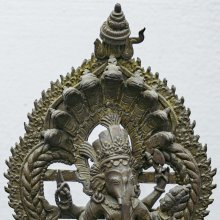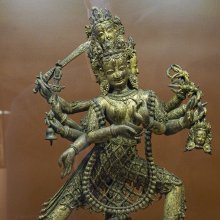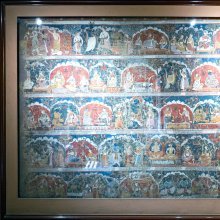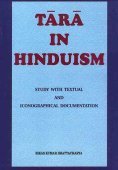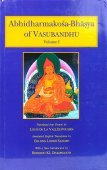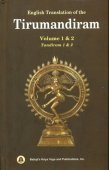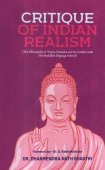Siddhi: 43 definitions
Introduction:
Siddhi means something in Buddhism, Pali, Hinduism, Sanskrit, Jainism, Prakrit, the history of ancient India, Marathi, Hindi. If you want to know the exact meaning, history, etymology or English translation of this term then check out the descriptions on this page. Add your comment or reference to a book if you want to contribute to this summary article.
Images (photo gallery)
(+8 more images available)
In Hinduism
Shaktism (Shakta philosophy)
Source: Wisdom Library: ŚāktismSiddhi (सिद्धि, “perfection”):—Name of one of the sixty-four mātṛs to be worshipped during Āvaraṇapūjā (“Worship of the Circuit of Goddesses”, or “Durgā’s Retinue”), according to the Durgāpūjātattva. They should be worshipped with either the five upācāras or perfume and flowers.
Her mantra is as follows:
Source: Google Books: Manthanabhairavatantramॐ सिद्ध्यै नमः
oṃ siddhyai namaḥ.
Siddhi (सिद्धि) is a variant for Siddha, which refers to the Cave associated with Kāmarūpa, one the eight Sacred Seats (pīṭha), according to the Yogakhaṇḍa (chapter 14) of the Manthānabhairavatantra, a vast sprawling work that belongs to a corpus of Tantric texts concerned with the worship of the goddess Kubjikā.
Source: Kamakoti Mandali: The Yoginis of Narasimha VyuhaSiddhi (सिद्धि) is the name of a Mātṛkā-Śakti created by Mahārudra in order to control the plague of demons created by Andhakāsura.—Accordingly, Andhaka-Asura tried to kidnap Umā (Devī Pārvatī), and was fiercely attacked by Mahārudra who shot arrows at him from his mahāpināka. when the arrows pierced the body of Andhakāsura, drops of blood fell to earth and from those drops, thousands of Andhakas arose. To control this plague of demons, Mahārudra created Mātṛkā-Śaktis [viz., Siddhi] and ordered them to drink the blood of the demons and drain them dry.
Source: Kamakoti Mandali: Nrisimha matrika-mandalaSiddhi (सिद्धि) refers to one of the various Mātṛkā-Śaktis created by Rudra in order to destroy the clones that spawned from Andhaka’s body.—Accordingly, [...] Andhakāsura attempted to abduct Girājanandinī (Pārvatī) and thus ensued a fierce battle between Andhakāsura and the great Rudra, the Lord of Umā. Like raktabīja, every drop of blood that fell from the body of Andhaka created another Asura like him and in no time, the entire world was filled with Andhakas. To destroy the growing number of Andhakas, Rudra created innumerable Mātṛkā-Śaktis [viz., Siddhi]. These Śaktis of immense power at once began to drink every drop of blood that flowed from the body of Andhaka, but they could still not effectively contain the emergence of more and more demons.

Shakta (शाक्त, śākta) or Shaktism (śāktism) represents a tradition of Hinduism where the Goddess (Devi) is revered and worshipped. Shakta literature includes a range of scriptures, including various Agamas and Tantras, although its roots may be traced back to the Vedas.
Pancaratra (worship of Nārāyaṇa)
Source: SriMatham: Vaiṣṇava Iconology based on Pañcarātra ĀgamaThe Yoga Sutras give the following enumeration of the Siddhis:—
- anima — ability to become infinitely small like an atom
- mahima — ability to become huge
- laghima — ability to become very light
- garima — ability to become very heavy
- prāpti — ability to obtain anything desired
- prakāmya — ability to become irresistible
- īśita — ability to rule over others
- vaśita — ability to completely subjugate and control others
Some other texts give a slightly different list: —
- ātma-siddhi — power to be completely unattached and unaffected by material nature.
- vividha-siddhi — power to control matter, and minds of others.
- jñāna-siddhi — ability to remember past incarnations of oneself and of others, and the power to see the future.
- tapas-siddhi — perfect control over heat and cold, hunger and thirst, etc.
- kṣetra-siddhi — ability to astral travel anywhere in the universe.
- deva-siddhi — control over devas, demons, elementals, nature spirits and others.
- śarīra-siddhi — attainment of physical perfection, to delay the aging process, have perfect health and to heal others.
- vikriya-siddhi — power to accomplish all desires, to change ones appearance into any desired form.
These siddhis are the outcome of intense yogic practice, but they are undesirable as they can possibly be the cause of one’s downfall from the spiritual path through distraction of the mind from the Ultimate Reality. Sooner or later every serious yoga practitioner is accosted by one of these gate-keepers (dvārapālaka), but one should not heed them.

Pancaratra (पाञ्चरात्र, pāñcarātra) represents a tradition of Hinduism where Narayana is revered and worshipped. Closeley related to Vaishnavism, the Pancaratra literature includes various Agamas and tantras incorporating many Vaishnava philosophies.
Dharmashastra (religious law)
Source: Wisdom Library: Dharma-śāstraSiddhi (सिद्धि) is a Sanskrit technical term, used in warfare, referring to “achievement” (of the king), using the three divisions of his strength (śakti). The word is used throughout Dharmaśāstra literature such as the Manusmṛti. (See the Nītiprakāśikā 8.87)

Dharmashastra (धर्मशास्त्र, dharmaśāstra) contains the instructions (shastra) regarding religious conduct of livelihood (dharma), ceremonies, jurisprudence (study of law) and more. It is categorized as smriti, an important and authoritative selection of books dealing with the Hindu lifestyle.
Natyashastra (theatrics and dramaturgy)
Source: Wisdom Library: Nāṭya-śāstra1) Siddhi (सिद्धि) is the Sanskrit name for a deity to be worshipped during raṅgapūjā, according to the Nāṭyaśāstra 3.1-8. Accordingly, the master of the dramatic art who has been initiated for the purpose shall consecrate the playhouse after he has made obeisance (e.g., to Siddhi).
2) Siddhi (सिद्धि) refers to “success”. According to the Nāṭyaśāstra 6.10, success in the dramatic performance is of two kinds:
- divine (daivikī)
- and human (mānuṣī).
2) Siddhi (सिद्धि, “siddhi”) translates to “persuasion” and refers to one of the thirty-six “characteristic features” (lakṣaṇa) of perfect ‘poetic compositions’ (kāvyabandha) and ‘dramatic compositions’ (dṛśyakāvya, or simply kāvya). According to the Nāṭyaśāstra chapter 17, these thirty-six lakṣaṇas act as instructions for composing playwrights.
(Description of siddhi): When name of many relevant persons are mentioned with a view to accomplish the object aimed at, it is an instance of Persuasion (siddhi, lit. “success”).
3) Siddhi (सिद्धि) refers to “success” in the dramatic production according to Nāṭyaśāstra chapter 27.—“`Siddhi (success) which arises from words, sattva and gestures (vāksattvāṅga) is of two kinds: divine (daivikī), and human (mānuṣī), and relates to various psychological states (bhāva) and sentiments (rasa). The human success has ten features, and the divine success two; and they (i.e. such features) consist mostly of various sattvas expressed vocally (vāṅmayī) and physically (śārīrī).
Vocal success (siddhi): Slight Smile (smita), Smile (ardhahāsa) and Excessive Laughter (atihāsa), ‘excellent’ (sādhu), ‘how wonderful’ (aho), ‘how pathetic’ (kaṣṭa), and tumultuous applause (pravṛddhanāda, lit. swelling uproar) are the signs of the Success (siddhi) expressed vocally (vāṅmayī).
Physical success (siddhi): Joy expressed in horripilation, the rising up from the seat and the giving away of clothes (celadāna) and throwing of rings (aṅguli-kṣepa) are signs of the Success (siddhi) expressed physically (śārīrī).
4) Siddhi (सिद्धि) is the name of a cloud whose sound corresponds to the Āṅkika note made by drums (puṣkara) according to the Nāṭyaśāstra chapter 33. Accordingly, “after seeing that the Mṛdaṅgas, Paṇavas and Dardaras have been made, the great sage Svāti brought about a similarity of their notes with those of clouds... The cloud named Siddhi gave note to Āṅkika... Those who want Success of performances should make to these clouds, offerings which are dear to spirits (bhūta)”.

Natyashastra (नाट्यशास्त्र, nāṭyaśāstra) refers to both the ancient Indian tradition (shastra) of performing arts, (natya—theatrics, drama, dance, music), as well as the name of a Sanskrit work dealing with these subjects. It also teaches the rules for composing Dramatic plays (nataka), construction and performance of Theater, and Poetic works (kavya).
Vaishnavism (Vaishava dharma)
Source: ISKCON Press: GlossarySiddhi (सिद्धि).—Mystic perfections usually acquired by yoga practice and natural to residents of Siddhaloka:
- becoming small like a particle (aṇimā-siddhi),
- or lighter than a soft feather (laghimā-siddhi),
- Get anything from everywhere (prāpti-siddhi),
- becoming heavier than the heaviest (mahimā-siddhi),
- create something wonderful or annihilate anything at will (īśitva-siddhi),
- to control all material elements (vaśitva-siddhi),
- possessing such power as will never be frustrated in any desire (prākāmya-siddhi),
- assuming any shape or form one may even whimsically desire (kāmāvasāyitā-siddhi).
Siddhi (सिद्धि) refers to “perfection. There are eight mystic siddhis achieved by aṣṭāṅga-yogīs”. (cf. Glossary page from Śrīmad-Bhagavad-Gītā).
Source: Pure Bhakti: Brhad BhagavatamrtamSiddhi (सिद्धि) refers to:—Mystic perfection. (cf. Glossary page from Śrī Bṛhad-bhāgavatāmṛta).

Vaishnava (वैष्णव, vaiṣṇava) or vaishnavism (vaiṣṇavism) represents a tradition of Hinduism worshipping Vishnu as the supreme Lord. Similar to the Shaktism and Shaivism traditions, Vaishnavism also developed as an individual movement, famous for its exposition of the dashavatara (‘ten avatars of Vishnu’).
Purana and Itihasa (epic history)
Source: Wisdom Library: The Matsya-purāṇaSiddhi (सिद्धि) is the name of a mind-born ‘divine mother’ (mātṛ), created for the purpose of drinking the blood of the Andhaka demons, according to the Matsya-purāṇa 179.8. The Andhaka demons spawned out of every drop of blood spilled from the original Andhakāsura (Andhaka-demon). According to the Matsya-purāṇa 179.35, “Most terrible they (e.g., Siddhi) all drank the blood of those Andhakas and become exceedingly satiated.”
The Matsyapurāṇa is categorised as a Mahāpurāṇa, and was originally composed of 20,000 metrical verses, dating from the 1st-millennium BCE. The narrator is Matsya, one of the ten major avatars of Viṣṇu.
Source: Wisdom Library: Skanda-puranaSiddhi (सिद्धि, “perfect being”) refers to one of the fifty-six vināyakas located at Kāśī (Vārāṇasī), and forms part of a sacred pilgrimage (yātrā), described in the Kāśīkhaṇḍa (Skanda-purāṇa 4.2.57). He is also known as Siddhivināyaka, Siddhigaṇeśa and Siddhivighneśa. These fifty-six vināyakas are positioned at the eight cardinal points in seven concentric circles (8x7). They center around a deity named Ḍhuṇḍhirāja (or Ḍhuṇḍhi-vināyaka) positioned near the Viśvanātha temple, which lies at the heart of Kāśī, near the Gaṅges. This arrangement symbolises the interconnecting relationship of the macrocosmos, the mesocosmos and the microcosmos.
Siddhi is positioned in the Eastern corner of the first circle of the kāśī-maṇḍala. According to Rana Singh (source), his shrine is located at “Manikarnika Gali, CK 9 / 1”. Worshippers of Siddhi will benefit from his quality, which is defined as “giving relief from the curse of Yama/Death-god”. His coordinates are: Lat. 25.18702, Lon. 83.00869 (or, 25°11'13.3"N, 83°00'31.3"E) (Google maps)
Siddhi, and the other vināyakas, are described in the Skandapurāṇa (the largest of the eighteen mahāpurāṇas). This book narrates the details and legends surrounding numerous holy pilgrimages (tīrtha-māhātmya) throughout India. It is composed of over 81,000 metrical verses with the core text dating from the before the 4th-century CE.
Source: archive.org: Puranic Encyclopedia1) Siddhi (सिद्धि).—A daughter of Dakṣa. Thirteen daughters including Siddhi were married by Dharmadeva. (Viṣṇu Purāṇa, Aṃśa 1, Chapter 7).
2) Siddhi (सिद्धि).—A goddess. Kuntī the mother of the Pāṇḍavas was the human rebirth of this goddess. (Mahābhārata Ādi Parva, Chapter 67, Verse 120). This goddess Siddhi had walked in front of the army of Subrahmaṇya, in the great battle between the Devas and the asuras. To attain the object in any matter, the blessing of this goddess is essential. (Mahābhārata Śalya Parva, Chapter 46, Verse 64).
3) Siddhi (सिद्धि).—The son of an Agni (fire) named Vīra. Siddhi was born to this Vīrāgni, by his wife Sarayū. The story stating how this agni once screened the sun by his radiance, occurs in Mahābhārata, Śalya Parva, Chapter 218.
Source: archive.org: Shiva Purana - English TranslationSiddhi (सिद्धि, “achievement”) is one of the twenty-four daughters of Dakṣa by Prasūti: one of the three daughters of Svāyambhuvamanu and Śatarūpā, according to the Śivapurāṇa 2.1.16:—“Dakṣa begot twenty-four daughters. Thirteen daughters Śraddhā etc. were given to Dharma in marriage by Dakṣa. O lordly sage, listen to the names of Dharma’s wives. Their names are [... Siddhi (achievement, accomplishment),...]. Thereupon the entire universe consisting of three worlds, mobile and immobile was filled (with progeny). Thus according to their own actions and at the bidding of Śiva innumerable famous Brahmins were born out of the various living beings”.
Source: Cologne Digital Sanskrit Dictionaries: The Purana Index1a) Siddhi (सिद्धि).—Wife of Bhaga.*
- * Bhāgavata-purāṇa VI. 18. 2.
1b) A daughter of Dakṣa; married Dharma; mother of Sukha.*
- * Brahmāṇḍa-purāṇa I. 9. 50, 61, 62; Vāyu-purāṇa 10. 25, 37; Viṣṇu-purāṇa I. 7. 23 and 31.
1c) The wife of Kāma.*
- * Brahmāṇḍa-purāṇa II. 9. 62.
1d) A devī in the Cakrarājaratha.*
- * Brahmāṇḍa-purāṇa IV. 19. 4.
1e) A Kalā of Brahmā.*
- * Brahmāṇḍa-purāṇa IV. 35. 94.
1f) A mind-born mother.*
- * Matsya-purāṇa 179. 18.
1g) Of yoga; when one feels himself and the earth all of tejas becomes a siddha;1 the state of attaining the desired thing by means of vaivastya from the śarīrimahat;2 characteristics of: pratibhā, śravaṇa, darśan of devas and brahmāvarta;3 eight fold.4
1h) Eighteen in number of which ten are the principles of guṇas, and eight depend on Hari. These are Aṇimā, Mahimā, Laghimā, Prākāśya, Īśitva, Vaśita: other siddhis enumerated: All these are consequences of yoga.*
- * Bhāgavata-purāṇa XI. 15. 3-34. Brahmāṇḍa-purāṇa IV. 18. 18; 38. 38.

The Purana (पुराण, purāṇas) refers to Sanskrit literature preserving ancient India’s vast cultural history, including historical legends, religious ceremonies, various arts and sciences. The eighteen mahapuranas total over 400,000 shlokas (metrical couplets) and date to at least several centuries BCE.
Samkhya (school of philosophy)
Source: Wisdom Library: Sāṃkhya philosophySiddhi (सिद्धि, “attainment”) refers to a category of pratyayasarga (intellectual products) according to the Sāṃkhya theory of evolution. Pratyayasarga is the first of two types of sarga (products) that come into being during tattvapariṇāma (elemental manifestations), which in turn, evolve out of the two types of pariṇāma (change, modification).
There are eight types of siddhi (attainment) defined:
- adhyayana (study),
- śabda (oral instruction),
- ūha (proper reasoning),
- suhṛtprāpti (discussion with friend),
- dānā (purity),
- ādhyātmika-duḥkhabighāta (cessation of sorrow caused one's ownself),
- ādhibhautika-duḥkhabighāta (cessation of sorrow caused by human and sub-human beings),
- ādhidaivika-duḥkhabighāta (cessation of sorrow caused by super-human beings).

Samkhya (सांख्य, Sāṃkhya) is a dualistic school of Hindu philosophy (astika) and is closeley related to the Yoga school. Samkhya philosophy accepts three pramanas (‘proofs’) only as valid means of gaining knowledge. Another important concept is their theory of evolution, revolving around prakriti (matter) and purusha (consciousness).
Vyakarana (Sanskrit grammar)
Source: Wikisource: A dictionary of Sanskrit grammarSiddhi (सिद्धि).—Formation of a word; establishment of the correct view after the removal of the objection; e. g. संज्ञासिद्वि, कार्यसिद्धि, स्वरसिद्धि (saṃjñāsidvi, kāryasiddhi, svarasiddhi).

Vyakarana (व्याकरण, vyākaraṇa) refers to Sanskrit grammar and represents one of the six additional sciences (vedanga) to be studied along with the Vedas. Vyakarana concerns itself with the rules of Sanskrit grammar and linguistic analysis in order to establish the correct context of words and sentences.
Chandas (prosody, study of Sanskrit metres)
Source: Shodhganga: a concise history of Sanskrit Chanda literature1) Siddhi (सिद्धि) is the alternative name of a Sanskrit metre (chandas) mentioned by Hemacandra (1088-1173 C.E.) in his auto-commentary on the second chapter of the Chandonuśāsana. Siddhi corresponds to Citralatā, Rucirā, Śaśivadanā. Hemacandra gives these alternative names for the metres by other authorities (like Bharata), even though the number of gaṇas or letters do not differ.
2) Siddhi (सिद्धि) refers to one of the 135 metres (chandas) mentioned by Nañjuṇḍa (1794-1868 C.E.) in his Vṛttaratnāvalī. Nañjuṇḍa was a poet of both Kannada and Sanskrit literature flourished in the court of the famous Kṛṣṇarāja Woḍeyar of Mysore. He introduces the names of these metres (e.g., Siddhi) in 20 verses.

Chandas (छन्दस्) refers to Sanskrit prosody and represents one of the six Vedangas (auxiliary disciplines belonging to the study of the Vedas). The science of prosody (chandas-shastra) focusses on the study of the poetic meters such as the commonly known twenty-six metres mentioned by Pingalas.
Shaivism (Shaiva philosophy)
Source: Shodhganga: Mantra-sādhana: Chapter One of the KakṣapuṭatantraSiddhi (सिद्धि) refers to “perfection”, “accomplishment” or “attainment” and is mentioned in the Kakṣapuṭatantra verse 1.11-13. There are various siddhis mentioned:
- vaśya (controlling others),
- ākarṣaṇa (attracting others),
- stambha (immoilizing others)
- moha (bewildering enemies),
- uccāṭa (extirpating enemies),
- māraṇa (killing others),
- vidveṣa (provoking enmity),
- vyādhikaraṇa (causing illness),
- paśuśasyārtha-nāśana (causing loss of cattle, grain and other properties),
- kautuka (conjuring tricks),
- indrajāla (creating illusions),
- yakṣiṇī-mantrasādhana (invoking yakṣīṇīs),
- ceṭaka (using someone as a slave),
- devāñjana (divine ointment),
- adṛśya (becoming invisible),
- pādukāgati (magic shoes),
- guṭikā (magic pill),
- khecaratva (going to the sky),
- mṛtasaṃjīvana (reviving the dead).
The Sādhakas (tantric practitioners), being accompanied by faith and amenability, and being suitable to and pleased by [a siddhi], have known each means of mantra. By excellent Sādhakas wishing the siddhi, the mantrasādhana should be performed in advance, for the sake of the siddhi. One would not attain any siddhi without the [means of] mantra-vidhāna (the classification of mantra).

Shaiva (शैव, śaiva) or Shaivism (śaivism) represents a tradition of Hinduism worshiping Shiva as the supreme being. Closely related to Shaktism, Shaiva literature includes a range of scriptures, including Tantras, while the root of this tradition may be traced back to the ancient Vedas.
Ayurveda (science of life)
Nighantu (Synonyms and Characteristics of Drugs and technical terms)
Source: WorldCat: Rāj nighaṇṭuSiddhi (सिद्धि) is another name for Ṛddhi, an unidentified medicinal plant, according to verse 5.28-33 of the 13th-century Raj Nighantu or Rājanighaṇṭu. The fifth chapter (parpaṭādi-varga) of this book enumerates sixty varieties of smaller plants (kṣudra-kṣupa). Together with the names Siddhi and Ṛddhi, there are a total of twelve Sanskrit synonyms identified for this plant.

Āyurveda (आयुर्वेद, ayurveda) is a branch of Indian science dealing with medicine, herbalism, taxology, anatomy, surgery, alchemy and related topics. Traditional practice of Āyurveda in ancient India dates back to at least the first millenium BC. Literature is commonly written in Sanskrit using various poetic metres.
Ganitashastra (Mathematics and Algebra)
Source: archive.org: Hindu MathematicsSiddhi (सिद्धि) represents the number 8 (eight) in the “word-numeral system” (bhūtasaṃkhyā), which was used in Sanskrit texts dealing with astronomy, mathematics, metrics, as well as in the dates of inscriptions and manuscripts in ancient Indian literature.—A system of expressing numbers by means of words arranged as in the place-value notation was developed and perfected in India in the early centuries of the Christian era. In this system the numerals [e.g., 8—siddhi] are expressed by names of things, beings or concepts, which, naturally or in accordance with the teaching of the Śāstras, connote numbers.

Ganitashastra (शिल्पशास्त्र, gaṇitaśāstra) refers to the ancient Indian science of mathematics, algebra, number theory, arithmetic, etc. Closely allied with astronomy, both were commonly taught and studied in universities, even since the 1st millennium BCE. Ganita-shastra also includes ritualistic math-books such as the Shulba-sutras.
Sports, Arts and Entertainment (wordly enjoyments)
Source: archive.org: Syainika Sastra of Rudradeva with English Translation (art)Siddhi (सिद्धि) refers to “having success” (in hunting), according to the Śyainika-śāstra: a Sanskrit treatise dealing with the divisions and benefits of Hunting and Hawking, written by Rājā Rudradeva (or Candradeva) in possibly the 13th century.—Accordingly, “Hunting by packs of dogs is that in which dogs are let loose at hares and other animals in arid tracts. In this success or otherwise (siddhi-asiddhi) depends upon the jumping of the hares and their falling into the dogs’ mouths. By their jumps and rebounds they produce abundance of laughter. [...]”.

This section covers the skills and profiencies of the Kalas (“performing arts”) and Shastras (“sciences”) involving ancient Indian traditions of sports, games, arts, entertainment, love-making and other means of wordly enjoyments. Traditionally these topics were dealt with in Sanskrit treatises explaing the philosophy and the justification of enjoying the pleasures of the senses.
General definition (in Hinduism)
Source: Ashtanga Yoga: Yoga Sutrani Patanjali
Supernatural powers (
In Buddhism
Theravada (major branch of Buddhism)
Source: Pali Kanon: Manual of Buddhist Terms and DoctrinesTransformation: power of: siddhi.
Theravāda is a major branch of Buddhism having the the Pali canon (tipitaka) as their canonical literature, which includes the vinaya-pitaka (monastic rules), the sutta-pitaka (Buddhist sermons) and the abhidhamma-pitaka (philosophy and psychology).
Tibetan Buddhism (Vajrayana or tantric Buddhism)
Source: BDK Tripiṭaka: The Susiddhikara-sūtraSiddhi (सिद्धि) refers to “accomplishment”, as detailed in Chapter 16 of the Susiddhikara-sūtra. Accordingly, “ascending into the sky and moving forward: this is the highest [accomplishment]. Concealing your form and hiding your traces: this is a middling accomplishment. Worldly deeds: these are lower siddhis. There are these three kinds: higher, middling, and lower accomplishments. [These] three kinds of accomplishment—ascending into the sky, hiding your form, and worldly deeds—are further divided into higher, middling, and lower [grades]”.

Tibetan Buddhism includes schools such as Nyingma, Kadampa, Kagyu and Gelug. Their primary canon of literature is divided in two broad categories: The Kangyur, which consists of Buddha’s words, and the Tengyur, which includes commentaries from various sources. Esotericism and tantra techniques (vajrayāna) are collected indepently.
In Jainism
General definition (in Jainism)
Source: archive.org: The Jaina IconographySiddhī (सिद्धी) is the name of a Yoginī mentioned in various Jaina manuscripts, often being part of a list of sixty-four such deities. How the cult of the Tantrik Yoginīs originated among the vegetarian Jainas is unknown. The Yoginīs (viz., Siddhī) are known as attendants on Śiva or Pārvatī. But in the case of Jainism, we may suppose, as seen before that they are subordinates to Kṣetrapāla, the chief of the Bhairavas.

Jainism is an Indian religion of Dharma whose doctrine revolves around harmlessness (ahimsa) towards every living being. The two major branches (Digambara and Svetambara) of Jainism stimulate self-control (or, shramana, ‘self-reliance’) and spiritual development through a path of peace for the soul to progess to the ultimate goal.
India history and geography
Source: Cologne Digital Sanskrit Dictionaries: Indian Epigraphical GlossarySiddhi.—(CII 4), emancipation; sometimes used at the beginning of documents to ensure the success of the undertaking, as siddham in early inscriptions, and meaning siddhir = astu. (SITI), same as siddham, the right of cultivating land. Cf. ūrdhv-ādhaḥ-siddhi-yutā (IA 18), together with income from horticulture and agriculture; cf. sa-bāhy-ābhyantara-siddhi, siddhi meaning ‘income’. (IE 7-1-2), ‘eight’. Note: siddhi is defined in the “Indian epigraphical glossary” as it can be found on ancient inscriptions commonly written in Sanskrit, Prakrit or Dravidian languages.
Source: Singhi Jain Series: Ratnaprabha-suri’s Kuvalayamala-katha (history)Siddhi (सिद्धि) refers to the achievement of various (occult) powers, which were commonly practiced in ancient India, as mentioned in the Kathās (narrative poems) such as Uddyotanasūri in his 8th-century Kuvalayamālā (a Prakrit Campū, similar to Kāvya poetry).—Page 191.28-32: Here is a reference to various Siddhis practised in medieval times, for example, Dhātuvāda, Añjana-siddhi, Bila-praveśa, Mantra-siddhi, Devatā Ārādhana.

The history of India traces the identification of countries, villages, towns and other regions of India, as well as mythology, zoology, royal dynasties, rulers, tribes, local festivities and traditions and regional languages. Ancient India enjoyed religious freedom and encourages the path of Dharma, a concept common to Buddhism, Hinduism, and Jainism.
Languages of India and abroad
Pali-English dictionary
Source: BuddhaSasana: Concise Pali-English Dictionarysiddhi : (f.) accomplishment; success.
Source: Sutta: The Pali Text Society's Pali-English DictionarySiddhi, (f.) (fr. sidh, Vedic siddhi) accomplishment, success, prosperity Mhvs 29, 70; Sdhp. 14, 17, 325, 469; PvA. 63 (attha° advantage); padasiddhi substantiation of the meaning of the word DA. I, 66; cp. sadda°. (Page 709)

Pali is the language of the Tipiṭaka, which is the sacred canon of Theravāda Buddhism and contains much of the Buddha’s speech. Closeley related to Sanskrit, both languages are used interchangeably between religions.
Marathi-English dictionary
Source: DDSA: The Molesworth Marathi and English Dictionarysiddhi (सिद्धि).—f (S) A supernatural power or faculty supposed to be acquirable through the performance of certain magical, mystical, or alchymical rites or processes. Eight are enumerated; viz. aṇimā, mahimā, garimā, laghimā, prāpti, prākāmya, īśitva, vaśitva, which see explained in their order. Hence 2 Any marvelous or extraordinary skill or capability. 3 The fruit or product of a course of ascetic severities, or of adoration of any particular divinity. 4 Accomplishment, completion, fulfilment; finished, effected, or attained state (of an article, fabrication, or work, of a business or an undertaking, of a purpose, object, or desire). 5 Establishment, substantiation, demonstration; proved or evinced state (of an argument, affirmation, cause, plea &c.) 6 Adjudgment, settlement, determination (of a dispute &c.) 7 Enactment, constitution, formation; framed or made state (of decrees, laws, rules &c.) 8 Readiness, preparedness through culinary or other operation (of articles of food, of medicines &c.) 9 Readiness, prepared or willing state (of a person to act, of an animal or a thing to be used). 10 Adeptness, attainedness, proficiency (in magical or mystical or alchymical rites or processes, or in the powers and properties flowing from the observance of them). 11 The perfection or accomplishment of mortal existence, viz. emancipation from transmigration, and beatification by absorption into the essence of the Supreme Spirit. 12 Prosperity or success; prosperous and flourishing state. 13 The sixteenth of the astronomical Yogas: also the nineteenth of the twenty-eight astrological Yogas. siddhīsa āṇaṇēṃ or nēṇēṃ To bring or carry to completion or accomplishment.
--- OR ---
siddhī (सिद्धी).—m (Or śiddhī, śiddī &c.) An Abyssinian, a Cidi.
Source: DDSA: The Aryabhusan school dictionary, Marathi-Englishsiddhi (सिद्धि).—f The fruit of a course of ascetic severities. Completion. Proved state. Readiness. siddhīsa nēṇēṃ Bring or carry to completion.
--- OR ---
siddhī (सिद्धी).—m An Abyssinian
Marathi is an Indo-European language having over 70 million native speakers people in (predominantly) Maharashtra India. Marathi, like many other Indo-Aryan languages, evolved from early forms of Prakrit, which itself is a subset of Sanskrit, one of the most ancient languages of the world.
Sanskrit dictionary
Source: DDSA: The practical Sanskrit-English dictionarySiddhi (सिद्धि).—f. [sidh-ktin]
1) Accomplishment, fulfilment, completion, perfection, complete attainment (of an object); विरोधि सिद्धेरिति कर्तुमुद्यतः (virodhi siddheriti kartumudyataḥ) Kirātārjunīya 14.8; क्रियासिद्धिः सत्त्वे भवति महतां नोपकरणे (kriyāsiddhiḥ sattve bhavati mahatāṃ nopakaraṇe) Subhāṣ.
2) Success, prosperity, welfare, well-being.
3) Establishment, settlement.
4) Substantiation, demonstration, proof, indisputable conclusion.
5) Validity (of a rule, law &c.).
6) Decision; adjudication, settlement (of a law-suit); कार्यकारण- सिद्धौ च प्रसन्ना बुद्धिरव्यया (kāryakāraṇa- siddhau ca prasannā buddhiravyayā) Rām.4.18.47; तस्मान्न लेखसामर्थ्यात् सिद्धिरैकान्तिकी मता (tasmānna lekhasāmarthyāt siddhiraikāntikī matā) Śukra. 4.726.
7) Certainty, truth, accuracy, correctness.
8) Payment, liquidation (of a debt); अधमर्णार्थसिद्ध्यर्थमुत्तमर्णेन चोदितः (adhamarṇārthasiddhyarthamuttamarṇena coditaḥ) Manusmṛti 8.47.
9) Preparing, cooking (as of drugs &c.).
1) The solution of a problem.
11) Readiness.
12) Complete purity or sanctification.
13) A superhuman power of faculty; (these faculties are eight:-aṇimā laghimā prāptiḥ prākāmyaṃ mahimā tathā | īśitvaṃ ca vaśitvaṃ ca tathā kāmāvasāyitā ||).
14) The acquisition of supernatural powers by magical means.
15) Marvellous skill or capability.
16) Good effect or result.
17) Final beatitude, final emancipation.
18) Understanding, intellect.
19) Concealment, vanishing, making oneself invisible.
2) A magical shoe (supposed to convey the wearer wherever he likes).
21) A kind of Yoga.
22) Name of Durgā.
23) Complete knowledge.
24) Advantage, use, good effect.
25) Name of Śiva (m. in this sense).
26) Efficacy, efficiency.
27) Becoming intelligible (as sounds or words).
28) (In Rhet.) The pointing out in the same person of various good qualities.
Derivable forms: siddhiḥ (सिद्धिः).
Source: Cologne Digital Sanskrit Dictionaries: Shabda-Sagara Sanskrit-English DictionarySiddhi (सिद्धि).—f.
(-ddhiḥ) 1. Fulfilment, accomplishment, the entire completion of any undertaking or attainment of any object. 2. A Yoga, either the sixteenth of the astronomical periods termed Yogas, or the nineteenth of the twenty-eight astrological Yogas. 3. Final emancipation from existence, supreme felicity. 4. Prosperity, success. 5. Knowledge, understanding. 6. Accuracy, correctness, indisputable conclusion or position. 7. Validity, (in law.) 8. Acquittance, discharge, (of a debt.) 9. Concealment, secreting, covering. 10. The result or fruit of the adoration of the gods or of ascetic severities. 11. The supposed acquirement of supernatural powers by the completion of magical, mystical, or alchemical rites and processes. 12. A wooden shoe or slipper, especially one over which some mystical formulæ have been repeated, and which will then, it is supposed, convey the wearer every where safely and rapidly. 13. A medicinal root; also Rid'dhi. 14. Settlement, establishment. 15. Certainty, truth. 16. Decision, (of a law suit.) 17. The solution of a problem. 18. Preparation, cooking. 19. Readiness. 20. Complete sanctification. 21. Beatitude. 22. Marvellous skill or capability. 23. Making oneself invisible. E. ṣidh to accomplish, aff. ktin .
Source: Cologne Digital Sanskrit Dictionaries: Benfey Sanskrit-English DictionarySiddhi (सिद्धि).—i. e. sidh + ti, f. 1. Accomplishment, [Vedāntasāra, (in my Chrestomathy.)] in
Siddhi (सिद्धि).—[feminine] hitting or reaching the aim, attainment of an object, performance, accomplishment, conclusion, result; success, prosperity, welfare; perfection, supernatural power.
Source: Cologne Digital Sanskrit Dictionaries: Monier-Williams Sanskrit-English Dictionary1) Siddhi (सिद्धि):—[from sidh] 1. siddhi f. driving off, putting aside, [Yājñavalkya]
2) [from sidh] 2. siddhi f. (for 1. See p. 1215, col. 1) accomplishment, performance, fulfilment, complete attainment (of any object), success, [Mahābhārata; Kāvya literature] etc.
3) [v.s. ...] the hitting of a mark ([locative case]), [Kāmandakīya-nītisāra]
4) [v.s. ...] healing (of a disease), cure by ([compound]), [Yājñavalkya]
5) [v.s. ...] coming into force, validity, [ib.]
6) [v.s. ...] settlement, payment, liquidation (of a debt), [Manu-smṛti viii, 47]
7) [v.s. ...] establishment, substantiation, settlement, demonstration, proof, indisputable conclusion, result, issue, [Ṛgveda-prātiśākhya; Upaniṣad; Sarvadarśana-saṃgraha]
8) [v.s. ...] decision, adjudication, determination (of a lawsuit), [Horace H. Wilson]
9) [v.s. ...] solution of a problem, [ib.]
10) [v.s. ...] preparation, cooking, maturing, maturity, [ib.]
11) [v.s. ...] readiness, [Horace H. Wilson]
12) [v.s. ...] prosperity, personal success, fortune, good luck, advantage, [Manu-smṛti; Mahābhārata] etc.
13) [v.s. ...] supreme felicity, bliss, beatitude, complete sanctification (by penance etc.), final emancipation, perfection, [cf. Lexicographers, esp. such as amarasiṃha, halāyudha, hemacandra, etc.]
14) [v.s. ...] vanishing, making one’s self invisible, [Horace H. Wilson]
15) [v.s. ...] a magical shoe (supposed to convey the wearer wherever he likes), [ib.]
16) [v.s. ...] the acquisition of supernatural powers by magical means or the sup° faculty so acquired (the eight usually enumerated are given in the following Śloka, aṇimā laghimā prāptiḥ prākāmyam mahimā tathā īśitvaṃ ca vaśitvaṃ ca tathā kāmāvasāyitā ; sometimes 26 are added e.g. dūra-śravaṇa, sarvajña-tva, agni-stambha etc.), [Sāṃkhyakārikā; Tattvasamāsa; Sarvadarśana-saṃgraha]
17) [v.s. ...] any unusual skill or faculty or capability (often in [compound]), [Pañcatantra; Kathāsaritsāgara]
18) [v.s. ...] skill in general, dexterity, art, [Caraka]
19) [v.s. ...] efficacy, efficiency, [Kāvya literature; Pañcatantra]
20) [v.s. ...] understanding, intellect, [Horace H. Wilson]
21) [v.s. ...] becoming clear or intelligible (as sounds or words), [Bhāgavata-purāṇa]
22) [v.s. ...] (in [rhetoric]) the pointing out in the same person of various good qualities (not usually united), [Sāhitya-darpaṇa]
23) [v.s. ...] ([probably]) a work of art, [Rājataraṅgiṇī iii, 381]
24) [v.s. ...] a kind of medicinal root (= ṛddhi or vṛddhi), [cf. Lexicographers, esp. such as amarasiṃha, halāyudha, hemacandra, etc.]
25) [v.s. ...] (in music) a [particular] Śruti, [Saṃgīta-sārasaṃgraha]
26) [v.s. ...] a [particular] Yoga (either the 16th or 19th), [Colebrooke]
27) [v.s. ...] Success or Perfection personified, [Mahābhārata; Varāha-mihira’s Bṛhat-saṃhitā]
28) [v.s. ...] Name of Durgā, [Kathāsaritsāgara]
29) [v.s. ...] of a daughter of Dakṣa and wife of Dharma, [Purāṇa]
30) [v.s. ...] of the wife of Bhaga and mother of Mahiman, [Bhāgavata-purāṇa]
31) [v.s. ...] of a friend of Danu, [Kathāsaritsāgara]
32) [v.s. ...] of one of the wives of Gaṇeśa, [Religious Thought and Life in India 215, 2]
33) [v.s. ...] Name of Śiva (in this sense m.), [Mahābhārata]
Source: Cologne Digital Sanskrit Dictionaries: Yates Sanskrit-English DictionarySiddhi (सिद्धि):—(ddhiḥ) 2. f. Fulfilment, completion; perfection; final bliss; success; knowledge; correctness; payment; concealment; perfection in magic; magic shoe; 16th yoga.
Source: DDSA: Paia-sadda-mahannavo; a comprehensive Prakrit Hindi dictionary (S)Siddhi (सिद्धि) in the Sanskrit language is related to the Prakrit word: Siddhi.
[Sanskrit to German]
Sanskrit, also spelled संस्कृतम् (saṃskṛtam), is an ancient language of India commonly seen as the grandmother of the Indo-European language family (even English!). Closely allied with Prakrit and Pali, Sanskrit is more exhaustive in both grammar and terms and has the most extensive collection of literature in the world, greatly surpassing its sister-languages Greek and Latin.
Hindi dictionary
Source: DDSA: A practical Hindi-English dictionarySiddhi (सिद्धि):—(nf) acquisition, accomplishment; proof; fulfilment, success; supernatural powers supposed to be acquired through Yogic practices (see [aṣṭasiddhi); ~kara/kāraka/prada] causing to achieve or helping in the achievement of a [siddhi; ~guṭikā] see ~[siddhaguṭikā] (under [siddha].
...
Prakrit-English dictionary
Source: DDSA: Paia-sadda-mahannavo; a comprehensive Prakrit Hindi dictionarySiddhi (सिद्धि) in the Prakrit language is related to the Sanskrit word: Siddhi.
Prakrit is an ancient language closely associated with both Pali and Sanskrit. Jain literature is often composed in this language or sub-dialects, such as the Agamas and their commentaries which are written in Ardhamagadhi and Maharashtri Prakrit. The earliest extant texts can be dated to as early as the 4th century BCE although core portions might be older.
Kannada-English dictionary
Source: Alar: Kannada-English corpusSiddhi (ಸಿದ್ಧಿ):—
1) [noun] that which is accomplished, fulfilled, achieved.
2) [noun] the process of accomplishing or fact of being accomplished.
3) [noun] the emancipation of an individual soul from the worldly attachments and the cycle of births and deaths.
4) [noun] a preparing, making ready or being prepared, made ready.
5) [noun] any of the eight super human powers accomplished by yogis.
6) [noun] any unusual skill, faculty or capability.
7) [noun] (yoga.) one of the twenty seven yogas.
8) [noun] (math.) a symbol for the number eight.
Kannada is a Dravidian language (as opposed to the Indo-European language family) mainly spoken in the southwestern region of India.
See also (Relevant definitions)
Starts with (+81): Siddhia, Siddhibhairava, Siddhibhairavatantra, Siddhibhajana, Siddhibhumi, Siddhibhumimarga, Siddhibija, Siddhicamundatirtha, Siddhida, Siddhidandika, Siddhidandikastava, Siddhidarshin, Siddhidatar, Siddhidatri, Siddhidaya, Siddhidayaka, Siddhidvadasha, Siddhigana, Siddhiganesha, Siddhigarttayaga.
Ends with (+213): Abhimatasiddhi, Abhishtasiddhi, Abhisiddhi, Abhyantara-siddhi, Advaitabrahmasiddhi, Advaitasiddhi, Ahimsasiddhi, Ajadapramatrisiddhi, Ajnasiddhi, Alokanasiddhi, Amarasiddhi, Amoghasiddhi, Amritasiddhi, Anagatasiddhi, Animasiddhi, Anjanasiddhi, Annasiddhi, Antarikshasiddhi, Anuktasiddhi, Anyathasiddhi.
Full-text (+1488): Sarvasiddhi, Anima, Mantrasiddhi, Nayasiddhi, Ishitva, Rasasiddhi, Gutika, Marana, Mahiman, Khecaratva, Akshepini, Siddhivinayaka, Siddhimat, Siddhidatri, Mahasiddhi, Phalasiddhi, Karyasiddhi, Siddhilabha, Ishita, Taratara.
Relevant text
Search found 164 books and stories containing Siddhi, Siddhī; (plurals include: Siddhis, Siddhīs). You can also click to the full overview containing English textual excerpts. Below are direct links for the most relevant articles:
Bhakti-rasamrta-sindhu (by Śrīla Rūpa Gosvāmī)
Verse 2.1.192 < [Part 1 - Ecstatic Excitants (vibhāva)]
Verse 3.2.130 < [Part 2 - Affection and Service (dāsya-rasa)]
Verse 3.4.73 < [Part 4 - Parenthood (vātsalya-rasa)]
Shrimad Bhagavad-gita (by Narayana Gosvami)
Verse 4.12 < [Chapter 4 - Jñāna-Yoga (Yoga through Transcendental Knowledge)]
Verse 18.45 < [Chapter 18 - Mokṣa-yoga (the Yoga of Liberation)]
Verse 18.46 < [Chapter 18 - Mokṣa-yoga (the Yoga of Liberation)]
Garga Samhita (English) (by Danavir Goswami)
Verse 8.10.19 < [Chapter 10 - The Paddhati and Paṭala of Lord Balarāma]
Verse 8.10.3 < [Chapter 10 - The Paddhati and Paṭala of Lord Balarāma]
Verse 5.15.26 < [Chapter 15 - Seeing Sri Radha]
Manusmriti with the Commentary of Medhatithi (by Ganganatha Jha)
Verse 2.93 < [Section XVIII - Control of Sensual Desires]
Verse 12.11 < [Section IV - Meaning of Tridaṇḍa (“triple control”)]
Verse 6.42 < [Section VI - Procedure of going forth as a Wandering Mendicant]
The Practice Manual of Noble Tārā Kurukullā (by Dharmachakra Translation Committee)
Related products
(+2 more products available)
